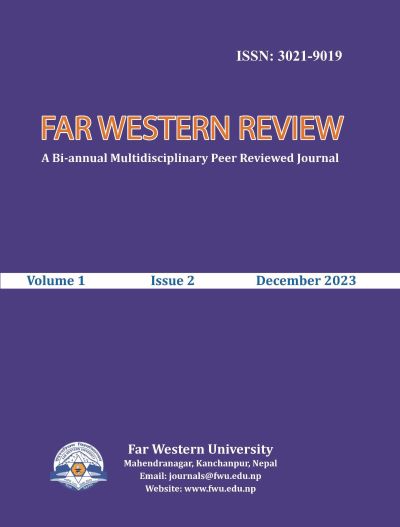Working Environment and Benefit Differences in Indo-Nepal Labour Migration
DOI:
https://doi.org/10.3126/fwr.v1i2.62110Keywords:
Working condition, benefit difference, labour migration, Nepal and IndiaAbstract
The open border between Nepal and India has encouraged people to migrate across the border for better livelihood. People from Sudurpaschim Province are disproportionately attracted to India for four important reasons: close distance, low travel cost, access to jobs and network. Likewise, Indian people from particularly from the border towns of Bihar, Uttar Pradesh, Uttarakhand and West Bengal States usually come to Nepal searching for employment or better opportunities. The burgeoning migration research in Nepal often ignores migration to India, and there has hardly been any research on Indian migration to Nepal. This paper attempts to make a comparative study of Indo-Nepal migration, focusing on working environment, i.e., work natures, working conditions, and their benefits such as income, and welfare benefits of both migrants’ groups. Bhimdatt Municipality of Kanchanpur District was selected as the study area. A mixed methodology has been adopted for this study. For Quantitative data collection, sample survey was conducted with 650 respondents (370 for Nepali-labour migrants to India and 270 Indian labour-migrants to Nepal). Using ISCO/08, ILO (2012), skills classification framework, this paper shows Nepali migrants works lack technical skills (91% being at basic level, as menial workers) as opposed to the Indian migrants, majority of whom have some technical skills, such as operating machines (54.3% vs. 7.3%). This has reflection on their earning and welfare benefits and condition of work and living. Indian migrants earn an average of NRs. 40635.5 per month, compared to NRs. 19061.6 earned by Nepali migrants. In case of Nepali labour-migrants who work in registered companies, business houses along with mutual agreement for job get allowances, overtime facility, medical insurance however, it is not found in case of Indian labour-migrants working in different technical sectors in Nepal. Policy makers need to work on promoting skills of the migrant workers enabling them to take up better paid jobs at home and migration destinations.
Downloads
Downloads
Published
How to Cite
Issue
Section
License

This work is licensed under a Creative Commons Attribution-NonCommercial 4.0 International License.
CC BY-NC: This license allows reusers to distribute, remix, adapt, and build upon the material in any medium or format for noncommercial purposes only, and only so long as attribution is given to the creator.




